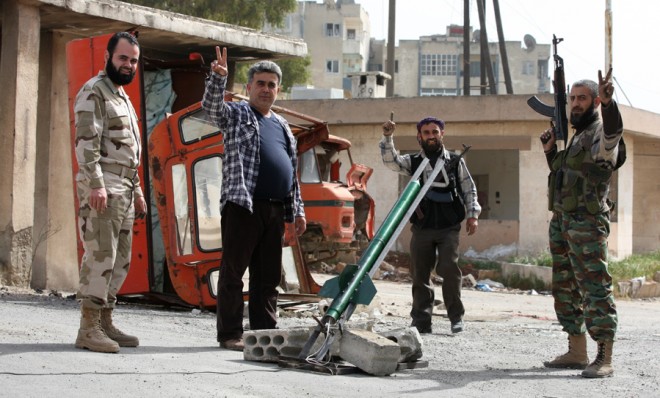Would arming Syria's rebels just prolong the war?
And would it be enough to tip the balance of power against Bashar al-Assad?


A free daily email with the biggest news stories of the day – and the best features from TheWeek.com
You are now subscribed
Your newsletter sign-up was successful
With evidence mounting that Syria's armed forces have started using chemical weapons against rebels, the Obama administration is reportedly considering getting more deeply involved in the country's bloody civil war by sending arms to some of the opposition fighters. Republican senators are putting pressure on President Obama to act fast, saying that the move is long overdue. But a key question persists: After more than two years of fighting and 70,000-plus deaths, would giving the rebels greater power really give them the boost they need to topple President Bashar al-Assad's regime?
Some analysts say the answer is no. Obama is reportedly considering supplying rebels with everything from communications gear to armored vehicles to shoulder-fired anti-aircraft missiles. "That military gear can prolong the conflict, preventing dictator Bashar Assad from crushing the rebels," says Spencer Ackerman at Wired. "It is unlikely to tip the balance of the war toward the rebels so they can decisively" win.
Assad has a variety of advantages — an adaptive military estimated at over 50,000; complete air superiority; chemical weapons — that he will retain even if Obama opens a new arms pipeline. Overcoming those advantages means getting, at the least, U.S. and allied airpower involved — a step the Obama administration, and especially the military, want to avoid. Especially since it might involve shooting down Iranian planes, a fateful step. [Wired]
It's still worth a shot, others say. Early in Syria's uprising, "a sharp diplomatic and economic shove might have convinced elements of the regime to give up on the Assad family," says Michael Gerson at The Washington Post. But Obama wanted to avoid wading into another conflict in the Middle East, in hopes of "improving the image of America in the Islamic world." Things obviously didn't pan out. Now he's "missed the moment," and the best we can hope for is limiting the damage we could face from "a civil war at the heart of the Middle East that destabilizes friendly governments, empowers jihadists, increases sectarian tensions across the region, and allows Iran broader opportunities for mischief."
The Week
Escape your echo chamber. Get the facts behind the news, plus analysis from multiple perspectives.

Sign up for The Week's Free Newsletters
From our morning news briefing to a weekly Good News Newsletter, get the best of The Week delivered directly to your inbox.
From our morning news briefing to a weekly Good News Newsletter, get the best of The Week delivered directly to your inbox.
The United States should not accept the refounding of the Assad regime on a vast pile of skulls. And the United States should not accept the disintegration of Syria into enclaves, some of them sheltering al-Qaeda affiliates. So Obama has little choice but to help the rebels to win, while helping the right rebels to win out in a post-Assad power struggle. But delay has made this task much more difficult. Civil wars, over time, tend to favor the ruthless and radical. As options for arming the rebels narrow — for fear of weapons falling into the hands of future enemies — the pressure for direct U.S. action (particularly a no-fly zone) increases. [Washington Post]
One nearly certain outcome is that beefing up the rebels' arsenal would escalate the violence. "It would also make the regime of Bashar Assad more desperate," says Fareed Zakaria at TIME. "Perhaps Assad has already used chemical weapons; with his back against the wall, he might use them on a larger scale."
If the objective is actually to reduce the atrocities and minimize potential instability, the key will be a political settlement that gives each side an assurance that it has a place in the new Syria. That was never achieved in Iraq, which is why, despite U.S. troops and arms and influence, the situation turned into a violent free-for-all. If some kind of political pact can be reached, there's hope for Syria. If it cannot, U.S. assistance to the rebels or even direct military intervention won't change much: Syria will follow the pattern of Lebanon and Iraq — a long, bloody civil war. And America will be in the middle of it. [TIME]
A free daily email with the biggest news stories of the day – and the best features from TheWeek.com
Harold Maass is a contributing editor at The Week. He has been writing for The Week since the 2001 debut of the U.S. print edition and served as editor of TheWeek.com when it launched in 2008. Harold started his career as a newspaper reporter in South Florida and Haiti. He has previously worked for a variety of news outlets, including The Miami Herald, ABC News and Fox News, and for several years wrote a daily roundup of financial news for The Week and Yahoo Finance.
-
 The environmental cost of GLP-1s
The environmental cost of GLP-1sThe explainer Producing the drugs is a dirty process
-
 Greenland’s capital becomes ground zero for the country’s diplomatic straits
Greenland’s capital becomes ground zero for the country’s diplomatic straitsIN THE SPOTLIGHT A flurry of new consular activity in Nuuk shows how important Greenland has become to Europeans’ anxiety about American imperialism
-
 ‘This is something that happens all too often’
‘This is something that happens all too often’Instant Opinion Opinion, comment and editorials of the day
